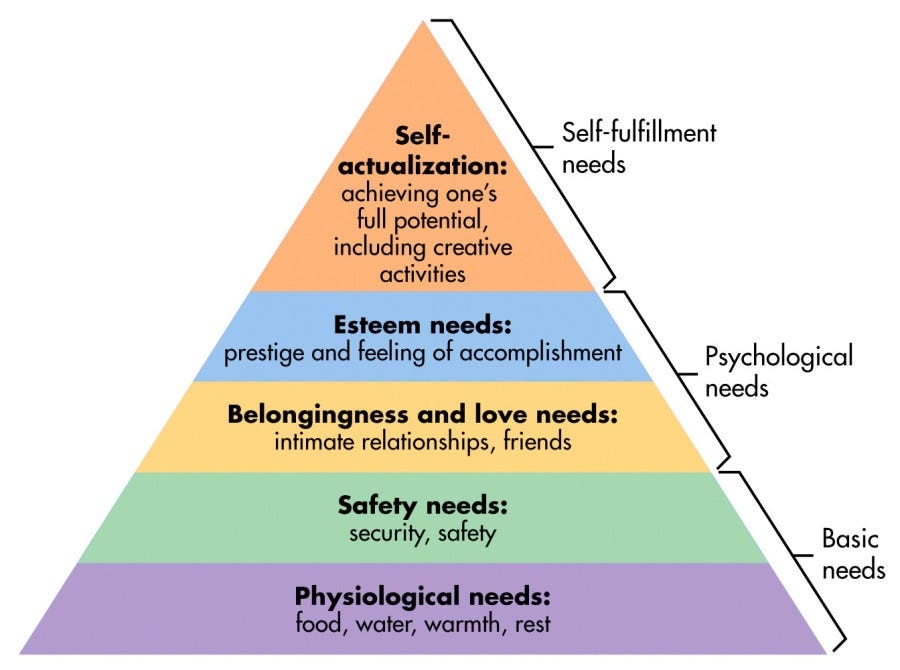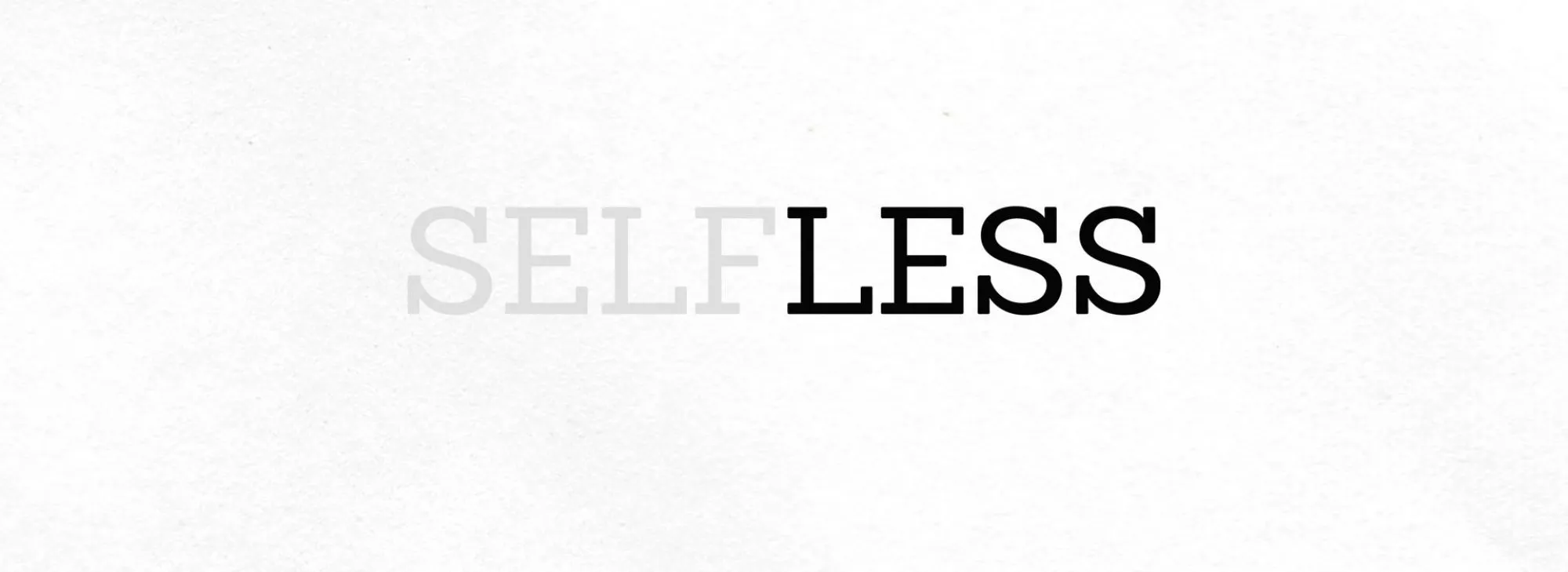Being both selfish and selfless
I started writing this last year, after our best year so far. And then, mid June the slight twinge in my back became debilitating, I was referred on to an orthopaedic surgeon and other specialists. I could barely stand upright (just imagine the stance of Neanderthal Man), and even when I did there was so much pain. My daily 45 minute walks to and from work were shelved indefinitely.
Wiped out of action for close to two months. While at the time it was unsettling, uncertain and seemingly serious, one can look back, laugh and learn.First and foremost, our team kept projects ticking without losing a beat. It’s nice to know you’ve got others when you most need.
Under the haze of some mighty fine painkillers, I pondered this …
“It is critical that at regular intervals the values and psychological needs of yourself AND those around you are reflected on, and alignment and misalignment identified.”
Likely an individual’s values fall within Maslow’s hierarchy of needs. A psychological need for the basic physiological needs of life (water, food etc), a sense of safety (financial and emotional), desire for love and belonging, seeking to feel esteem, happy and content about themselves and self-actualisation to be themselves, make a difference and succeed. (In later years, Maslow also defined higher level need for self-transcendence through spirituality and giving beyond oneself.)

Our values and psychological needs will likely change at life stages, as we balance priorities, lessons and new perspectives. Further to this, individuals reliant on each other, likely have notably differing values. We need to balance our own values with family, friends, workmates and others.
Some people may be risk averse and place a higher value on their physiological and safety needs. Others may have a more risk seeking, aspirational or entrepreneurial mind-space, and skew their thinking towards seeking higher levels of esteem and self-actualisation. (Measure your risk taking here)
Some critical values of family, friends and others may be neglected by risk takers. A trade-off is deemed reasonable between the strong desire for achieving self-actualisation and their view of success, at the cost of a sense of safety. The entrepreneurial mantra it is OK to fail suggests that success comes from a willingness to accept lower levels of safety and a higher burden of risk.
Stories are often told of successful people, failing in their personal lives. Or, those that seemed to have it all, but there were cracks below the surface covered with sticky tape and glue. And, people who just died too young. The memory is rarely of the financial success of an individual, but the stories with family, friends and others, values and contribution to the wider good.
Even with the most love, it is easy for the values of family, friends, workmates and others to become misaligned. The biggest risk likely comes from highly ambitious and aspirational people. They can have a tendency to believe that identical risk tolerances, and willingness to sacrifice needs such as psychological safety and love and belonging and short-term sacrifice for potential long-term return. Sadly in the lives of many such individuals the success they envisioned is never achieved and they are left with a feeling of regret at missing what really matters in life.
Much discussion goes on about failure and how it is OK, even a badge of honor for any entrepreneur, but there are times when it is not OK, and contingencies need to be considered. If one is independent from all others and self-sufficient to the world around, perhaps the impact of failure is less, but even so no person is an island where failure waves will not be felt by others.
There are key points needing to be made about FAILURE
- If you are going to fail, try to do so early, fast and small;
- Plan not to fail;
- Learn from failing; and
- Know when failing is NOT OK.
There are times when it is not OK to fail, and it confuses and creates unnecessary risk. Three ways failure is NOT OK …
- Breaking the law — criminal, tax, civil, commercial etc..
- Unreasonably risking future physical, mental and financial health.
- Placing the safety of others in danger—family, friends, staff etc
While these may seem obvious, for some they are not, especially the more ambitious. Think about some of the major financial collapses in history (list here), likely those responsible justified the high levels of risk and legal breaches as justifying the likely reward. And, it would not be difficult to find a small or larger business failure that is not similarly justified. Those with high levels of success seeking, and valuing self-actualisation above all else, face potential imbalance above others.
It is unfair for an entrepreneur to unnecessarily erode the needs of family, staff and others. The core role of a small business owner to the CEO of a larger business is to pay staff, suppliers and fulfil other legal and regulatory requirements. Staff on a sinking ship financially or psychologically will likely underperform, be distracted and unengaged, further eroding the cultural positivity and increasing redundancies, and likely making recruitment tough. Psychological safety is said to be highly correlated to strong performance shared belief that the team is safe for interpersonal risk taking (More here).
Similarly, and in many ways more importantly, it is critical to have adequate consideration of psychological needs beyond work. To be able provide food and the necessities to support themselves and their family, psychological safety and feeling a sense of love and belonging. It is unreasonable for an entrepreneur to assume staff and family (partner, children and other dependents) have similar willingness to sacrifice short-term safety and other psychological needs for potential future reward.
Ensuring psychological alignment is critical. More so, the responsibility sits on the shoulders of those with risk seeking tendency, with a psychological skew towards seeking higher levels of esteem and self-actualisation.
For an entrepreneur it is critical to have adequate contingencies in place such as income and other insurances. A strong and highly trusted team with aligned values and psychological needs is critical, all working together to grow revenue and make a profit … Phew! Those able to work as a team and when necessary autonomously with high quality processes, like clock work … tick tock, tick tock, tick tock … .
Sufficient savings, funds and working capital, close bank relationship and sales projections. A viable cash-positive business model, growth strategy, key performance measurement framework and achievable budget forecast.
For a parent entrepreneur, a supportive and aligned family is critical. There will be times when even with the best attempts, FAILURE will raise its ugly head. Having a loving family there to provide consistency, love, care when needed and grounding to reality is a lucky asset to have. However, such an asset also comes with liability. The children of an entrepreneur did not choose a risk seeking parent. It is essential that the psychological needs of all are considered beyond the potential aspirational selfishness.
To be a successful entrepreneur is likely argued by many as being much more selfish and highly driven, than selfless (watch The Founder about the building of McDonald’s as a good example of selfish). I would like to see success as more about being as Professor Muhammad Yunus founder of Grameen Bank and Nobel Peace Prize Laureateaid stated in a recent talk entrepreneurs should be …
“Selfish and selfless at the same time.”
https://www.instagram.com/p/Bgnf9SaHfGI/?taken-by=jasondunstone
It is essential to balance the psychological needs of yourself, family and others for clothing, shelter, food and water; to personal and financial; and health and well-being; love and belonging from friendships, intimacy and family; need to feel respected; a desire to accomplish everything that one can; and seeking spiritual and fulfilment beyond being selfish. If is critical to realise that, the fundamental consistency of what drives people emerging from our consumer research over many years is family.
Also, things may go great, and other times you may be hit by a curve ball taking you out of the game for a short or longer time. It is critically important to consider the safety net against accidents and illness and their adverse impacts. As shit can and will happen, so do all you can to be ready. As your family and staff have a right to feel psychologically safe. It is easy to be selfish, yet far more complex it seems to be selfish and selfless at the same time.
It is easy to forget what matters, without pausing to reflect occasionally, forced or otherwise.





